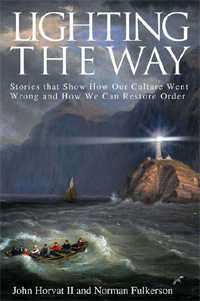
When I was much younger, I remember listening to a song from the band REM which begins with the words:
The world is collapsing around my ears
I turned up the radio
but I can’t hear it…
Nearly thirty years ago, in the idylls of the fading century, that song was poetry. Looking back now, however, I see that it was unintentional prophecy.
Indeed, our country has been wracked by a nationwide bomb scare, shooting sprees against innocent people in restaurants and bars and even attending funerals or at prayer. These explosions of violence are hardly localized. In the past few years, we have witnessed mass shootings wherein scores, even hundreds, of innocent people have been gunned down, sometimes for no discernible reason. Mass murders and gang rapes in Scandinavia and Russia, East Asia and India, North and Sub-Saharan Africa, and North and South America indicate that the patient initiation of the human person into the artistic, humane, and intellectual fruits of civilization—culture—is breaking down everywhere.
Barbaric wars in Syria and Yemen, the transformation of the People’s Republic of China into a techno-police state, and the return of megalomaniacal tyranny in the form of dictators in Turkey, North Korea, Russia, Saudi Arabia, and beyond, make clear that the world really is collapsing around us. We don’t need to turn up the radio—the disintegration of the human-scaled cosmos is in the very air that we breathe.
10 Razones Por las Cuales el “Matrimonio” Homosexual es Dañino y tiene que Ser Desaprobado
The temptation in times like ours is to turn to the State to solve our pressing problems. Whenever there is a mass shooting, for instance, there immediately follows the clamor for yet more legislation to restrict firearms. However, as Patrick Deneen makes clear in his 2018 book, Why Liberalism Failed, asking the organs and institutions of our liberal world order to solve the problems that soulless Leviathan helped bring about in the first place will only make whatever is ailing us worse. There must be some other, some better way.
Many readers are surely familiar with the writings of John Horvat II. A prolific writer and scholar, Horvat is also the author of the runaway bestseller, Return to Order: From a Frenzied Economy to an Organic Christian Society–Where We’ve Been, How We Got Here and Where We Need to Go (2013). There are more than 325,000 copies of this book in circulation. Horvat’s “propos[al to] return to those God-given institutions and principles that naturally regulate society and put it back in balance” has resonated deeply in the “frenzied economy” of the United States in the steadily-darkening twenty-first century.
However, for all the wisdom in Return to Order, what many readers wanted from the book was more concrete examples of how, exactly, those who desire to go back to the organic wholesomeness of human-centric, loving communities ought to “practice the cardinal virtues and a great love of God.” Many of us surely agree that we need to do this. But by what route? How?
Eternal and Natural Law: The Foundation of Morals and Law
The answers come in the follow-up volume to Return to Order, the newly-released Lighting the Way: Stories that Show How Our Culture Went Wrong and How We Can Restore Order (2018). Here, Horvat and his co-author, Norman J. Fulkerson, provide nearly fifty vignettes of people across the country who have found ways to repair the communal bonds that runaway globalism and statism dissolved and return to the orderly, humane societies in which our bodies and souls were made to reside.
Every think-tank in America puts out reams of white papers and policy reports detailing in excruciating bureaucratic detail what must be done to solve every conceivable problem plaguing our republic.
In Lighting the Way, Horvat and Fulkerson, with true humility, adopt the opposite approach. Instead of proclaiming generically what we should do, they went out in search of the wisdom of others. Unlike today’s puritanical secularist-fanatics, they did not shout into megaphones abrasive slogans of denunciation and command. Instead, Horvat and Fulkerson sought out examples of people doing the right thing and living good lives and then celebrated those examples in plainspoken, honest prose. Lighting the Way is a delight, a true balm in an age in which “frenetic intemperance,” as Horvat diagnoses our zeitgeist, has twisted our souls into cynical unreceptiveness to grace, mercy, hope, beauty, truth, and love.
 Learn All About the Prophecies of Our Lady of Good Success About Our Times
Learn All About the Prophecies of Our Lady of Good Success About Our Times
Reading the newspapers, one may be left with the impression that there are no good people left in the United States. Horvat and Fulkerson show us that this assessment is, thankfully, wrong. For instance, Lloyd Adams, a former social worker in Harlem, started a small business out of his apartment in the eighties selling carrot cakes. The recipe was simple, and the cakes were so delicious that eventually Lloyd’s Carrot Cake Bakery, in the gritty streets of the Bronx, became famous worldwide for its confections. Mr. Adams passed away in 2007, but his wife, Betty kept the business going. She sells hundreds of carrot cakes every week, and notes of appreciation have come in from across the country and around the world. The cake recipe came from Mr. Adams’ grandmother, and the simple joy of eating something delicious and pure has helped leaven the harshness of the Adams’ environment for more than thirty years.
One is not likely to find “bake tasty carrot cakes” in any policy directive coming out of Washington, D.C., and yet doing just that has arguably brought more happiness to the people of New York City than more than fifty years of government intervention.
Particularly enjoyable are the stories by Fulkerson from his native Kentucky, where he has gone “off the beaten path” to find men and women who have dedicated their lives to creating fine hams, bourbon, and Southern soul food. These things take time—generations—to love into existence, and those who reject the easy road of mass production and cheap imitation are themselves changed along the way. They learn to love their hometowns and the people in them.
Science Confirms: Angels Took the House of Our Lady of Nazareth to Loreto
When Christy Clark, proprietor of a family restaurant in Bardstown, Kentucky, lost her mother to cancer, she decided that anyone else undergoing chemotherapy would eat for free at her establishment. A fire later gutted her business, but the love that Ms. Clark had sown in her little community was repaid tenfold, as the town banded together to help her rebuild after she lost her source of income.
Giving away free meals is not a shortcut to success in the restaurant industry. But by taking the high road, Mrs. Clark found something greater than a healthy bottom line. Living in a small town is not easy, and there are always disagreements, misunderstandings and even betrayals to overcome. But in the end, it is the people around us who sustain us and help us live fully human lives. This is a lesson many of us have forgotten, and the book of Horvat and Fulkerson shows us how we can get back on track.

Purchase Your Copy Here
Although Lighting the Way is free of polemic and highfalutin philosophizing, the book is a clear rejection of the current cultural consensus as well as a high-toned Aristotelian vademecum about life, truth, and happiness. After reading the book, I have found myself noticing things that point to a brighter future—acts of kindness, cherished traditions, and remnants of the human person in the mechanized liberalism that is the leitmotif of our present anti-civilizational nightmare. The world is surely collapsing around our ears, but under the din of the wrecking ball can be heard hopeful whispers of the new and better world that will someday, God willing, rise from the ruins.
* * *
Jason Morgan is an associate professor at Reitaku University in Kashiwa, Japan. His work has appeared in Japan Review, Logos, the Michigan Historical Review, Human Life Review, Chronicles, Society, New Oxford Review, The Remnant, Japan Forward, Seiron, Crisis, Modern Age, Asia Times, and the proceedings of the Historical Awareness Research Committee.

